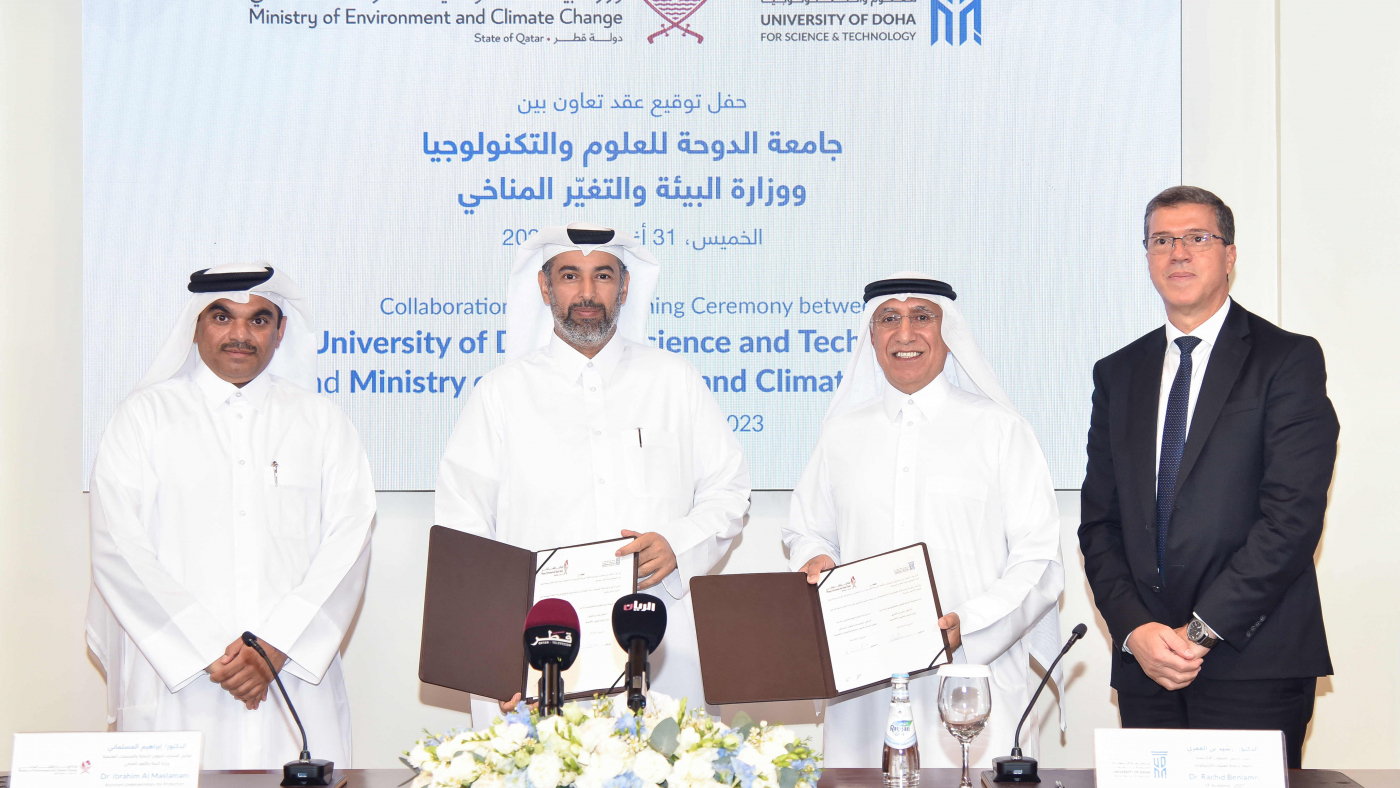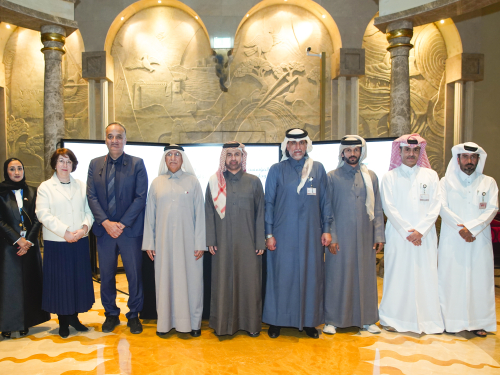
The Ministry of Environment and Climate Change signs a collaboration agreement with University of Doha for Science and Technology
The Ministry of Environment and Climate Change (MECC) announced the signing of a collaboration agreement this morning with University of Doha for Science and Technology (UDST) on campus, to pursue research, studies, and common environmental development projects. The ceremony was attended by His Excellency Sheikh Dr. Faleh bin Nasser bin Ahmed bin Ali Al Thani, Minister of Environment and Climate Change and Dr. Salem bin Nasser Al-Naemi, President of University of Doha for Science and Technology.
The agreement was signed by Dr. Ibrahim Al-Maslamani, the Assistant Undersecretary for Environmental Protection Reserves & Wildlife Department at MECC and Dr. Rachid Benlamri, Vice President of Academic Affairs at UDST in the presence of officials from both institutions.
His Excellency Sheikh Dr. Faleh bin Nasser bin Ahmed bin Ali Al Thani, Minister of Environment and Climate Change confirmed that the Ministry places a great emphasis on environmental research and said: “Collaborating with and supporting the national educational institutions to conduct research and understand the effect of environmental challenges to find solutions is an important step towards achieving The Qatar National Environment and Climate Change Strategy. This agreement is part of our commitment to implement the National Climate Change Plan 2030 which strikes a balance between the urgent need to work on climate change and environmental protection and the necessity to support sustainable social and economic development.”
His Excellency added: “It is our pleasure to support University of Doha for Science and Technology in their quest to conduct studies, research, and projects in addition to offering consultation on policies and procedures that are of common interest. We have explored the state-of-the-art facilities and laboratories at UDST and its world-class standards. We definitely look forward to outstanding results that will serve the environment and society in Qatar.
Commenting on this agreement, Dr. Salem bin Nasser Al-Naemi, President of UDST said: “We are proud with this strong collaboration. Our partnership today will offer great support to the multiple projects that we will be leading, notably those concerning technology and environmental sustainability. We thank the Ministry of Environment and Climate Change for their trust in this National University and our academic experts and researchers who will delve into studies that cover different topics such as climate change, hazardous chemicals and waste, social and economic impacts from human practices, and much more. As an applied university, we will follow an approach that maximizes the benefit of this method, and we are confident that this partnership will play an integral role in joining forces to face the current environmental challenges.”
Dr. Ibrahim Al-Maslamani, the Assistant Undersecretary for Environmental Protection Reserves & Wildlife Department at MECC said: “In our efforts to achieve the Qatar National Environment and Climate Change Strategy and to implement the National Climate Change Plan 2030, we build bridges of collaboration with different national higher education entities that are exerting efforts to conduct research in this field. UDST is one of these distinguished educational institutions that has developed important expertise in research and education in the field of environment preservation and the process of environmental sustainability, which is important to support the national environmental work.”
Commenting on the agreement, Dr. Al-Maslamani said that this collaboration will include a number of scientific research such as assessing the air quality, soil quality and water quality, and finding ways to preserve biodiversity in Qatar and depict the challenges that it is facing. Additionally, the work will include the development and rehabilitation of nature reserves. Many studies will be conducted to measure the impact of hunting on the environment and the fauna and flora. He commended the University’s efforts and its scientific team and research labs that are equipped with the latest technologies and expressed his confidence in the ability to produce accurate scientific research capable of competing against the world's best.
As part of the agreement, both entities will be working on many projects in the fields of biodiversity and wildlife, management, development and rehabilitation of nature reserves. Many studies will be conducted to measure the impact of hunting on the environment and fungal organisms inside and outside natural reserves, update environmental sensitivity maps, understand raw and construction materials, and assess the impact of development projects on the environment. There will also be a life cycle assessment in addition to understanding the social and economic impacts of human practices. The University will also work on the environmental conditions, including air quality, soil quality, water quality, noise pollution, and natural and geological heritage, as well as providing training for the Ministry's staff.



